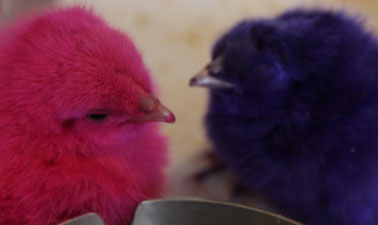
http://www.iloubnan.info/social/77736/Easter-in-Lebanon
Hot pink, fuzzy orange, facebook-blue or emerald green?
Easter is here and Lebanese baby chickens are changing color with the season. Parents are happy to give their kids a new playmate for the holidays and do so without consideration to the chicken´s suffering.
'People are not aware of how the chickens are suffering otherwise they wouldn't buy it,' said Dr Elias Nicolas, a veterinarian in Beirut.
According to Dr Nicolas, nine out of ten chickens die every Easter. It´s a common belief among the Lebanese that these chicks aren´t bred to survive and that their death is due to the coloring chemicals. Dr Nicolas said that this isn´t quite true, although the coloring process isn´t completely harmless, most chickens actually die of neglect or simply by being squeezed to death buy the hands of young children.
Jason Mier, executive director of Animals Lebanon, a non governmental organization, said that it is easy to see the cruelty of this business every step of the way. Dozens of chicks being tossed in large plastic containers full of dye, which is often poisonous in itself and the process leaves many of them with broken wings or legs. After that, the animals are kept in a carriage and are exposed to many different elements for hours or days, hoping to make a sale. The chickens are given to anyone who can pay regardless of their ability to meet the needs of the chicks or even keep them alive, especially as they need far more attention and care at this age.
The small percentage that survive this far are no better off as they are often abandoned in parking lots or next to dumpsters when they become too large or the people lose interest.
'The chickens are exposed to a lot of stress. From the first step of putting them on to a carriage out on the street, to moving to a new home and being passed from hand to hand and being played with by children. It´s a lot of stress for a newborn chicken,' Dr Nicolas said.
Many poultry farmers say that the coloring process is harmless but animal lovers have a different take on it and are saying that dyeing chickens is an issue bigger than that single action. This act turns baby chickens into living toys, which are quickly discarded a few days after Easter.
'It is inhumane to turn these animals into gifts and objects, only to then see them die early or be tossed away. If anything this teaches children not about the value of life and responsibility, but rather reinforces harmful believes that animals cannot feel are not important,' Mier said.
When the dyed chicks are sold, no instructions on how to care for them are usually given, although baby chicks are sensitive creatures and require special care in order to survive. For example, they need to be kept in hot temperatures. The first week of their lives they require an air temperature of 35 degrees Celsius. Every week, the temperature needs to be lowered by approximately three degrees until the chick is about 45 days old and ready to withstand regular temperature. For this, heat bulbs of 250 watt are recommended. However, the guy selling colorful chickens from a cart off the highway doesn´t carry these supplies.
In Lebanon there is no current law to protect animals from suffering, in fact the law doesn´t recognize animals as sentient creatures. A new draft law for the protection and welfare of animals was recently put forward to the parliament and has so far been approved by all MPs who have read it. Mier is very optimistic towards this law being enforced. If so, this might be the very last Easter to buy colored chickens off the streets in Lebanon. Holiday traditions may have to change a bit.
'By all means people should feel free to celebrate and be happy, but instead of making these animals suffer needlessly why not just color eggs?' Mier said.